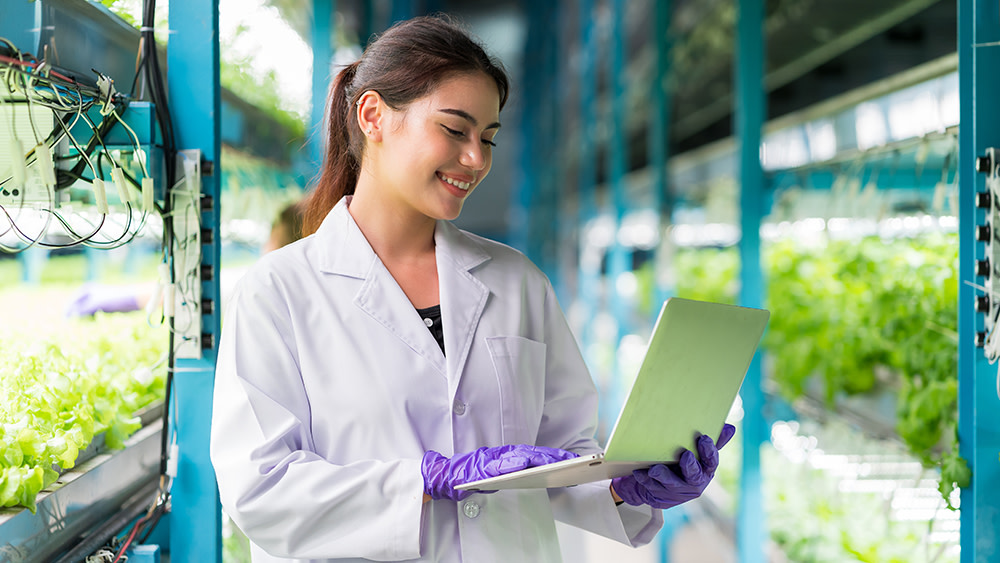Did you know the global food industry employs more than 2 million people and adds ~137,000 new jobs each year? As the demand for skilled professionals in food and beverage services continues to grow, students around the world now have greater access to top-ranked food technology courses in the US, opening exciting pathways to rewarding and future-ready careers.
Read on to learn more about food technology, the subjects these courses cover, and how a degree in food technology can help you prepare for your future.
What Do You Learn in a Food Technology Course?
Food technology courses provide students with in-depth insights into the science and process behind how food is produced, preserved, packaged, and made safe to eat. These programs combine knowledge from a variety of subjects, including biology, chemistry, engineering, and nutrition, teaching students about improving the quality, taste, and shelf life of food products.
Courses and majors are designed to provide in-depth technical knowledge and hands-on learning opportunities that prepare students for a wide range of roles in the food industry, along with versatile skills to pursue roles in other industries as well. Upon graduation, you can apply for positions like food technologist, food quality control specialist, research and development professional, and more.
Key Subjects in Food Technology
While most food technology courses in the US cover a variety of subjects based on the university’s specific curriculum, student preferences, and faculty recommendations, here are several key subjects you can expect to learn during your program:
Food chemistry and microbiology — Explore the combinations of proteins and fats to vitamins and minerals, and how they interact during processing and storage to make food ready to eat. Courses also cover how microorganisms play a vital role in food hygiene, preservation, and safety to ensure the ideal product reaches consumers.
Food processing and engineering — This area focuses on how raw ingredients are transformed into finished food products. Subjects teach students about food production methods, equipment, packaging systems, and the technology behind large-scale food manufacturing processes.
Nutrition and food quality — Students learn how to balance taste, nutrition, and safety in the end product on the shelf. These courses cover how to make food healthier, meet dietary standards, and maintain quality during transportation and storage.
Food safety and quality control — Learn about international food safety standards, local and international regulations, and food quality testing methods that ensure the food we eat is safe and reliable.
Product development and innovation — Put your knowledge to the test by designing new food products, from plant-based snacks to sustainable packaging solutions. Many universities even offer labs or research-based projects where students can test and present their own ideas to prospective investors for entrepreneurial opportunities.
Sustainability and food supply chain management — Modern food technology courses emphasize sustainability in the food manufacturing process. These subjects explore methods for reducing waste, improving food security, and developing environmentally friendly production methods.
Educational Requirements for a Food Technology Course
Food technology course details can vary, depending on the university and degree level. For students applying for a bachelor’s degree program in food technology, here are the most common requirements you may need to meet:
High school completion certificate
A strong academic record in STEM-field subjects, including biology, chemistry, physics, and mathematics
Proof of English language proficiency
Academic transcripts
Proof of financial security
Students applying for a master’s program may have slightly different requirements, such as a bachelor’s degree in a relevant field and a strong GPA. Those applying for a PhD program may require a master’s degree in food technology or a closely related field along with a detailed research proposal, academic transcripts, and more. Your advisor can provide you with the right preparation tools and documentation to apply to the best-fit university that offers a program matching your goals.
Types of Food Technology Programs
In the US, students can choose from several types of food technology programs — from short-term certificates to advanced research degrees — each designed to develop scientific knowledge, enhance technical skills, and provide practical experience in the food industry.
Associate programs — For those looking for a shorter or more affordable route, an associate degree in food technology is another good option. Usually offered by community colleges, this two-year program introduces students to the fundamentals of food science, processing, and quality control. It is a practical starting point for students who wish to enter the workforce quickly as food technicians or lab assistants, or who plan to transfer into a bachelor’s degree program later on.
Undergraduate programs — At the undergraduate level, students can pursue a bachelor’s degree in food technology or food science, which typically takes four years to complete. This program builds a strong foundation in areas like food chemistry, microbiology, processing, and nutrition. Students also learn about product development, quality assurance, and food safety standards.
Master’s programs — This program typically lasts between one and two years and includes advanced studies in food chemistry, biotechnology, product innovation, and safety regulations. Master’s program students often conduct research projects and develop analytical and leadership skills that prepare them for specialized roles, like food scientist, research specialist, or quality manager.
Doctoral programs — Those interested in research, innovation, or teaching at an university level may pursue a doctoral (PhD) program in food technology. PhD programs usually take three to five years and focus on independent research in specialized areas, such as food processing, microbiology, biotechnology, or sustainability. Students work closely with faculty mentors to conduct experiments, publish research papers, and contribute to scientific advancements in the food industry.
Tips To Choose the Right Food Technology Program
Choosing the right food technology course is an important decision, and one that can shape your education, career path, and future opportunities in the global food industry. Here are several things to keep in mind when choosing the right program for you.
Understand your career goals — Start by thinking about what kind of career you want after graduation. Are you more interested in food research, product development, quality control, or nutrition and health? If you enjoy science and lab work, a program with strong research facilities might be ideal. If you are drawn to the business side of food, consider programs that include modules in food marketing, management, or sustainability.
Research potential universities — Take into consideration the accreditation and rankings of the universities where you would like to apply. Accredited programs often have stronger industry connections and better job placement rates. Similarly, read about the university facilities and laboratories. Food technology is a hands-on field, so access to modern laboratories, pilot plants, and research centers is very important. Universities with up-to-date equipment and partnerships with food companies can give you valuable practical experience and exposure to real-world challenges.
Explore internship and research opportunities — Practical training plays a key role in this field, and this is why it is important to look for programs that include internships, co-op placements, or research projects. These experiences enhance your skills and also increase your career prospects after graduation.
Read student reviews and alumni outcomes — Hearing from current or former students can give you a realistic view of the program’s quality, teaching style, and career support. Many universities share alumni success stories that exemplify the kinds of career paths graduates typically follow.
To choose the right food technology course, it is important to identify programs that fit your career interests and enable you to accomplish your long-term goals.
Main Benefits of Studying Food Technology
Food technology is a discipline that provides graduates with a versatile skillset and opportunities to pursue multiple career opportunities in a wide variety of industries. Let’s take a look at key benefits of acquiring a degree in this field.
Technical and Scientific Skill Development
Programs are designed to help students understand the science behind how food is made, processed, and preserved. Through subjects like food chemistry, microbiology, and biotechnology, students learn to analyze the nutritional content of foods, detect contaminants, and improve food quality. Laboratory sessions, research projects, and practical experiments allow students to apply what they learn in real-world settings, from testing ingredients to developing new food formulations.
Students also gain technical expertise in using modern equipment and technologies found in the food industry. This includes learning how to operate processing machinery, conduct quality control tests, and use data analysis tools to monitor food production systems, preparing graduates with a strong technical and scientific background.
Career Flexibility in the Food Industry
A food technology degree opens doors to a variety of career paths across different industries and countries, giving graduates the chance to pursue opportunities in food production, quality assurance, product development, research, food safety, and supply chain management. For those who enjoy research and innovation, there are also opportunities in laboratories and research institutions where you can develop new food products or improve existing ones.
If you are more interested in the practical or business side of food technology, you might work with food manufacturers, restaurants, or global food brands to manage production processes, ensure product quality, or oversee sustainability efforts. This flexibility also extends across industries: Food technologists are needed not only in food and beverage companies, but also in pharmaceuticals, biotechnology, agriculture, environmental science, packaging industries, and more!
Innovation and Research Opportunities
As global food systems evolve, there is a constant need for new ideas to make food healthier, safer, and more sustainable. Studying food technology gives students the chance to thrive in an environment where they are driven to explore these challenges and contribute to meaningful advancements through research and innovation.
With the program’s emphasis on hands-on learning and scientific research, students often work in modern laboratories and research centers, including the use of AI in the global food industry. Through projects, internships, and research collaborations, students can experiment with new ingredients, test innovative preservation methods, or develop eco-friendly packaging solutions.
Career Paths After a Food Technology Course
The skills and knowledge you gain through a food technology course — from food science and safety to processing, nutrition, and research — prepare you for diverse roles across multiple sectors. Here is a list of career paths to consider, along with potential salaries:
Food Safety Specialist
Average Annual Salary
$69,064
Food Technologist
Average Annual Salary
$74,202
Nutritionist
Average Annual Salary
$60,042
Product Development Manager
Average Annual Salary
$89,122
Quality Assurance Specialist
Average Annual Salary
$54,842
Research and Laboratory Assistant
Average Annual Salary
$48,153
Supply Chain Manager
Average Annual Salary
$101,363
Source: Indeed, 2025
Job Market Outlook and Salary for Food Technologists
According to the U.S. Bureau of Labor Statistics (BLS), employment of food scientists and technologists is projected to grow about 6% from 2022 to 2032. As the global population increases and consumers become more health-conscious, there is a growing need for professionals who can ensure food safety, develop innovative products, and improve production efficiency.
The salary for food technologists in the US can vary based on your degree, experience, and location, along with the specific company and type of industry. Salaries can range between $54,786 to $100,499, while the average salary might be around $74,202 annually.
Food technology graduates can find opportunities across the food manufacturing industry: beverage companies, dairy, bakery, confectionery, meat and seafood processing, research laboratories, government agencies, and food startups. Students are also prepared to pursue roles in the global landscape, enabling them to explore rewarding careers and salaries.
Study at the Best US Universities with Shorelight’s Help
If you are interested in a food technology course, Shorelight advisors are available to help you navigate this process. From learning what is a food technology course and managing your food technology course fees to adjusting to campus life and making friends during your studies, Shorelight advisors provide one-on-one guidance and support throughout your higher education experience in the US. Begin your journey in food tech today!

